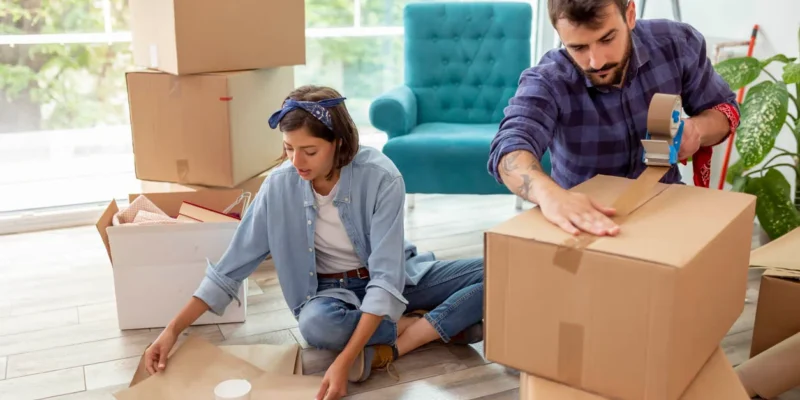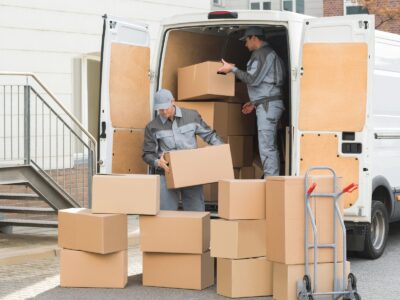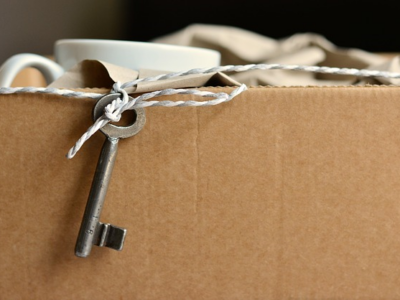Relocating to a new home, especially when crossing state borders, brings both excitement and hurdles. One critical yet often neglected aspect is the necessity of an essentials bag.
Picture this: you get to your new place, only to find that your daily necessities are lost in an ocean of moving boxes. This situation underscores the crucial need for an essentials bag—a compact yet thorough collection of items you’ll need right away.
In this guide, I’ll share tips on assembling an essentials bag for your interstate move. This bag will provide easy access to key items, ensuring a smoother, more manageable transition.
Understanding the Concept of An Essentials Bag
An essentials bag is more than just a moving box. It’s designed to keep vital items within easy reach throughout your move.
While regular moving boxes hold and contain most of your household belongings, an essentials bag is a well thought out bag that hold the immediate items you’ll most likely require the moment you step into your new home.
Why It the Essential Bag Important?
When you pack an essentials bag, it saves you from a last-minute scramble to search for things like your toothbrush, phone charger, or important documents the moment you need it most in your new home. Can you wonder what will happen if you forgot where you placed the garage remote or keys for the new house?
How Is the Essentials Bag Different from Regular Moving Boxes?

An essentials bag stands apart from regular moving boxes through its distinct purpose and contents. Regular moving boxes are typically used to transport all of your household belongings, from kitchenware to clothing and décor.
These boxes are often labeled and organized based on rooms or item categories, making them important for the overall move but not practical for immediate needs.
In contrast, an essentials bag is curated with the specific intention of accessibility and immediacy in mind.
When you get to your new home, think of the things that you need and curate his bag to include items like toiletries to freshen yourself up, a change of clothes to make you comfortable, basic kitchen supplies so you can at least make a cup of tea, important documents so you can connect your utilities, and electronics chargers so you remain connected.
The primary focus is to provide convenience and comfort during the first few days of settling in, eliminating the necessity of digging through multiple boxes to find your essentials.
Planning Ahead
Start with An Essentials Checklist
Creating an essentials checklist is the first step in effective packing. This organized approach helps you categorize items, making the packing process more manageable and systematic.
Listing everything out ensures you don’t forget any essential items, cutting down on the stress and chaos that moving often brings. Plus, a detailed checklist helps you prioritize tasks, allocate packing materials efficiently, and keep track of what’s packed and what still needs attention.
Categorizing Items
Break down your checklist into categories:
- Personal items: ID, wallet, electronics, clothing, keys, phones, bedding
- Household items: Kitchen tools, snacks, towels,
- Emergency and health items: First aid kit, medications, basic tools.
Timing
Start packing your essentials bag at least one week before your move. This timeline gives you ample opportunity to gather everything you need without last-minute stress. Go through your essentials checklist and remember to pack all the essentials you need. Taking the time to pack thoughtfully ensures you have all the necessities easily accessible during the transition to your new home.
Personal Essentials
Identification and Documents
Keep all essential documents like IDs, passports, and important papers in a zippered pouch or a document organizer. This ensures they are safe and easily accessible, especially while travelling interstate or in emergencies.
Additionally, consider making copies of these documents and storing them in a separate location or digitally. This extra step provides added security and peace of mind, knowing that you have backups in case of loss or theft.
Wallet and Cash
Ensure your wallet is stocked with necessary cash and cards. It’s always good to have both debit and credit cards for different types of transactions. But you never know when you may get caught out and have the need to use cash.
Maybe, the ATM’s are down, maybe it’s the weekends or maybe your phone just isn’t playing ball.
Having some cash on hand can be useful for unforeseen expenses during your interstate relocation, even when you hire best removalists they may still request payment in cash or you may find yourself needing some last-minute purchases. Planning ahead helps avoid any unexpected financial hiccups on moving day.
Electronics and Chargers
Ever find yourself scrambling to stay connected on the go? Having the phones charge overnight is one way to make sure your phone can last the distance. But also tossing in a power bank with your essentials is pure genius, especially for what feels like and endless moving day. Oh, and don’t forget a few extra charging cables and adapters.
Personal Care Items
When you’ve forgotten to have lots of water and the only fluids you’ve been consuming is six cans of Red Bull energy drinks to help you power through. You know that feeling of icky and muckiness right?
That’s why it’s so important to include your tooth brush and toothpaste feeling clean, shampoo, conditioner, and soap towel to have an option for a nice shower to help you feel more comfortable and settled during your initial transition.
Clothing
What about at the end of the moving day when you can feel that sweat dripping off you and soaked up into that t-shirt of yours? Pack a clean change of clothes, underwear, and socks to cover the first few days will allow you to take your time to unpack.
Moving can be exhausting, and having fresh clothes will help you feel more settled in your new home. If you plan on celebrating or exploring the first few days after moving, why not have a few nicer options for those spontaneous moments as you explore the new neighborhood.
Household Essentials
Basic Kitchen Items
A good homely cup of tea or nutritious meal after a day of moving is something that you’ll be looking forward to so pack all the kitchen essentials you need.
You may not be able to fit your big bulky food processor in your essentials bag but how about just a blender to make a smoothie? Tea bags, instant coffee and a few mugs. You can also do with basic utensils, paper plates, cups, and even a manual can opener, and a kettle.
With these, you can whip up simple meals like pasta, soup, or sandwiches without diving into all your kitchen boxes right away. Having these basics at your fingertips will make those first few days in a new place so much more pleasant.
Snacks and Water
Now who doesn’t get thirsty and peckish during a move. Moving is physically hard work, all that lifting, bending over and constant walking up and back, it’s sure to make you tire quickly and having quick snacks like muesli bars, raw nuts, or bags of dried fruit with plenty of icy cold bottled water, will sure keep your energy levels up and allow you to endure the move to the end.
Have them readily available to ensure you maintain your moral even if it’s just for the kids.
Basic Cleaning Supplies
Now when you’ve finally moved everything into your house, you’re probably itching to give it a good scrub and clean before unpacking and finding a place where things belong.
So it’s important to include some disposable glovers, cleaning wipes, paper towels and a duster just to quickly clean over surfaces. Taking this moment to tidy up will make your space feel more welcoming and comfortable.
Bedding and Sheets
A move day wouldn’t be complete without a nice comfy bed and clean sheets to rest on at the end of the day. Pack essential bed sheets, linens and pillow cases so you can setup your beds once they’re assembled. Who doesn’t like a comfy bed to relax in after your body has been through a battering from the lifting.
Packing Health Essentials
First Aid Kit
First aid kits can be a lifesaver when you move, there are just so many hazards that the chances of getting a graze, bruise or even a cut is rather high. So packing the first aid kit is not only crucial but essential.
Have at least the basics like band-aids for minor cuts, antiseptic to sterilize the wound, and even some dressing tape or scissors.
Personal Protective Equipment
Pack masks, gloves, and hand sanitizer, especially if you’re moving during a health crisis or pandemic. Ensure you have enough supplies to last the duration of your move and for everyone involved. Safety should always be a top priority.
Tools
Include a basic toolkit for any immediate repairs or setups. Even if it’s simply to assemble your furniture so you have a bed to sleep or to mount the TV stand back onto the TV.
Essential items such as screwdrivers, a hammer, pliers, tape, and a set of wrenches can help you get around all those basic tasks and immediately fix any unexpected issues that may arise when you’ve just moved in.
Additionally, consider adding a flashlight and some spare batteries just in case the electricity doesn’t get switched on in time.
Packing Tips and Tricks
- Create a packing list – This is so nothing essential is forgotten.
- Roll, don’t fold – Rolling your essential clothes saves space and reduces wrinkles.
- Use small vacuum bags – Keep items organized and compress clothing.
- Pack a portable laundry bag – Separate dirty clothes from clean ones.
- Fill shoes with small items: Maximize space by stuffing shoes with socks or toiletries.
- Use containers with the essential bag: Separate and compartment everything, like tea bags, coffee, electronic wires and disposable utensils.
Additional Tips for A Smooth Move
Get Multiple Quotes
For maximum value on your interstate move, seek multiple quotes from long distance moving companies.
Assess prices, services, and customer reviews to find a provider that matches your budget and requirements. Inquire specifically about what’s covered in each quote, such as packing services, insurance, car transportation services, and any additional charges.
Doing your homework and comparing quotes can help you dodge unexpected expenses and ensure a more seamless relocation.
Keeping Important Contacts Handy
Store a list of important contacts, including movers, real estate agents, and emergency numbers on your phone that you need quick access to. Having the right contact information and who to contact can save you a ton of time on moving day.
Preparing for The Unexpected
It’s better to be overprepared then underprepared and it’s definitely the case when bad weather can really throw off your move and cause significant delays. Avoid delays, and other potential disruptions by packing a compact umbrella, have extra layers of clothing or even a rain jacket.
Look up the travel route the night before, if there is a certain event on in the area you moving out of or to, have a plan to avoid highly congested zones. This way you’re preparing for the unexpected and that you’ll be comfortable and ready to handle anything that comes your way.
Staying Calm in Control and Flexible
It’s easy to veer off course on moving day when you have lots of things going on at the same time, often you’ll feel overwhelmed but all you still have to do and wonder how you are ever going to complete this by the end of the day. We are all human after all.
But it’s important to acknowledge your feelings let them pass and bring yourself back to maintain a sense of calm, keeping yourself in control, and being flexible enough to adjust to what moving day brings, this will result in a better moving experience.
Take those small moments out of the day to take regular breaks and fuel your body, if you find yourself just in GO,GO,GO mode it’s probably best to step away and control your heart rate by doing breathing exercises.
A positive mindset will also assist in staying calm throughout the process. There’s always help when you need it so don’t hesitate to ask for support when needed—whether from friends, family, or professional movers.
Conclusion
Now that you know exactly what goes in your essentials bag, there is no reason for you to not pack one for your interstate move. This carefully curated bag should include items that you will need immediately upon arrival at your new home, such as personal identification, important documents, electronics and chargers, personal care items, and basic household essentials.
By planning ahead and organizing your essentials bag with thoughtful consideration, you can avoid the chaos of searching through countless moving boxes for necessities. This preparation allows you to focus on settling into your new home comfortably and efficiently.
Remember, the key to a successful move lies in the details. An essentials bag not only provides immediate access to crucial items but also offers peace of mind, knowing that you are prepared for the first few days in your new space. This small yet significant step can make a big difference in your moving experience.
Packing an essentials bag is not just a practical necessity but a way to ensure you start your new chapter on the right foot. Embrace the adventure, stay organized, and enjoy your new home!










Comments